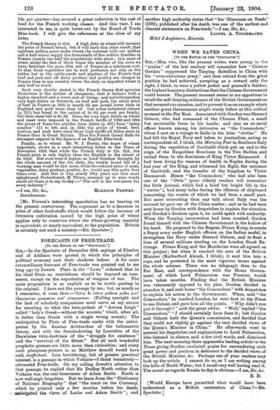[To THE EDITOR OP THE "SPECTATOR."] SIR,—In the Spectator of
December 26th sayings of Fenelon and of Addison were quoted in which the principles of political economy cast their shadows before. A far more extraordinary forecast of Free-trade was pointed out to me long ago by Jowett. Plato in the " Laws " ordained that in his ideal State no restrictions should be imposed on com- merce, except on the exportation of weapons of war. The main proposition is so explicit as to be worth quoting in the original. I have not the passage by me ; but, as nearly as I remember, it runs thus :—TOko; Be Tam, thagne pa.sm tc:17' it:07014E1,6n, xPrpicrwm perre elact70,‘GEYWY. (Failing eyesight and the lack of scholarly companions must serve as my excuse for resorting to what the hero-pedant of "Aurora Leigh" called "lady's Greek—without the accents," which, after all, is better than Greek with a single wrong accent.) The anticipation by Plato of Free-trade ranks with the antici- pation by the Samian .Aristarchus of the heliocentric theory, and with the foreshadowing by Lucretins of the Darwinian twin-doctrines of the "struggle for existence" and the "survival of the fittest." But all such wonderful prophetic guesses are little more than curiosities ; and every such plusquam-pioneer is, as Matthew Arnold would have said, ineffectual. Less bewildering, but of greater practical interest, is a passage in which Voltaire—I think tentatively— advocated Free-trade. On my calling Jowett's attention to that passage, he replied that Sir Dudley North rather than Voltaire was the real forerunner of Adam Smith. North is now well-nigh forgotten. But we learn from the "Dictionary of National Biography" that "the tract on the Currency, which he printed only a few months before his death, ,saticipated the views of Locke and Adam Smith "; and LIONEL A. TOLLEINLICHE.
Hotel cl'Angleterre, Biarritz.










































 Previous page
Previous page